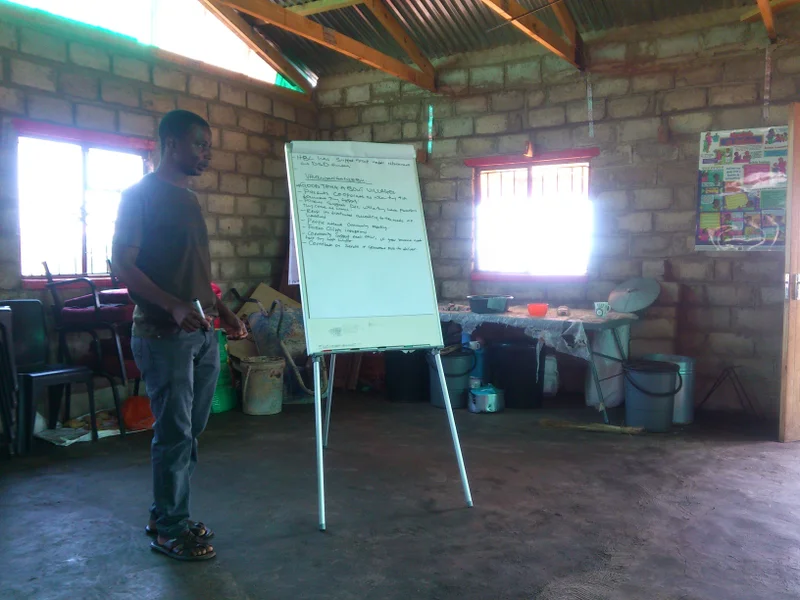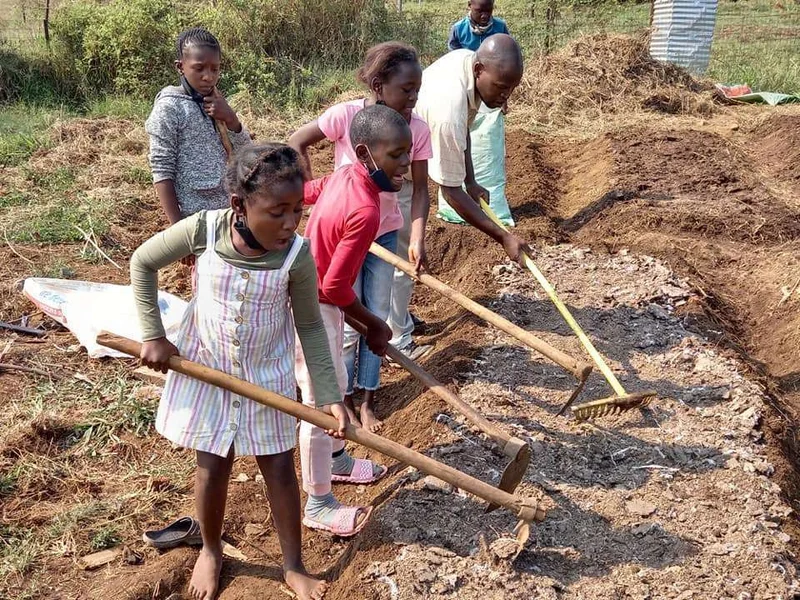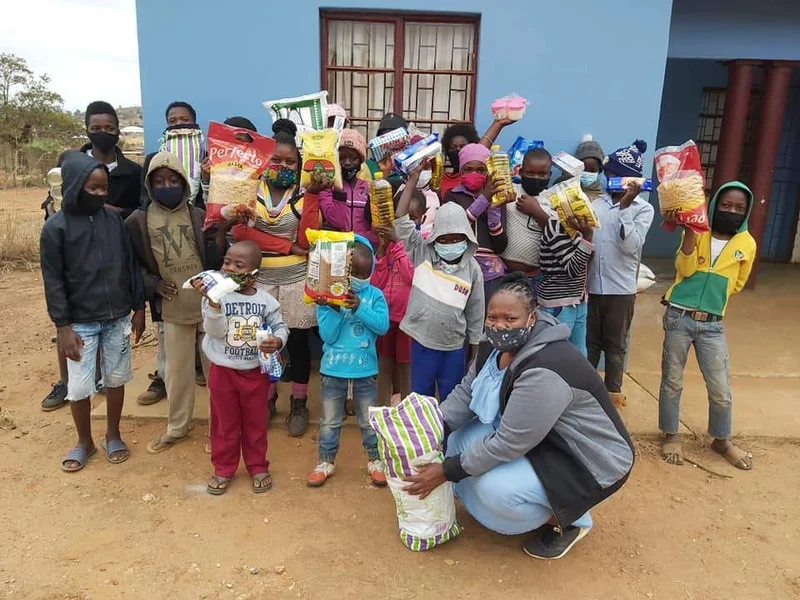[Original by Airi KAMIYAMA, Intern (July 7, 2022); Translated by E. Miyazaki/A. Taguchi]
Hi everyone! Following the previous blog, I will continue to report on the interview with our South African staff, Dudu, Moses, and Phillip. I was able to hear very interesting stories such as what they pay attention to at work in JVC, what they gained when working with people from different countries and so on. Please take a moment to read about Dudu, Moses, and Philip’s strong passion.
Why did you decide to join JVC?
Dudu: At first, I only thought that I had to find a job for myself and my family. However, I came to love this work of supporting the community after joining JVC. It has also given me an opportunity to learn about my country. South Africans do not travel much, but I gained opportunities to visit various places in Japan and South Africa.
Above all, I find it rewarding to support OVC (Orphans and Vulnerable Children: AIDS orphans and children made socially vulnerable by HIV/AIDS). I cannot bring change to all the children, but it fills me with joy when I can see change one by one.
Moses: I also felt at first that I need to work to live. But after joining JVC, I realized so many things that I didn’t know before. For example, I found that I love to be with children, and I began to have more passion for supporting the community and children.

Moses makes a presentation for volunteers at the care center.
Philip: I was growing vegetables at home and didn’t have a job outside. Then, I started working for a regional organization and supporting children in the community while learning about agriculture and local resources. One day, JVC was looking for someone who could interpret, so I decided to join JVC. Now, I love being with children.

Philip teaches children how to make a vegetable garden.
Kamiyama: It seems that all of you only wanted a job as a means of livelihood, but did you think of other options apart from joining JVC?
Dudu: I was interested in studying social work and psychology, but I did not have enough money to go to college after graduating from high school. However, at that time, JVC was holding an educational program with UNHCR for refugees and South Africans. I participated in the program. I also had an experience volunteering at JVC, and I became interested in working at JVC, so I decided to join.
I imagine that some have mental instability among the children JVC is supporting. What do you take care of when communicating with them?
Dudu: This is a very important point. Children think very differently from adults, so we have to be careful about it all the time. Children do not say their feelings in words very much. Even if they say it, it often doesn’t match with their actions… So, it is very important to observe them and catch their feelings. Moreover, children learn from our actions, so we need to be careful when we are with them.
Moses: Another important point is not to talk to children when we are mentally unstable. Children watch us very carefully, so they would think that we are irritated with house quarrels, or we are busy. When you talk with children, it is important to control your emotions and calm yourself down. Also, it is important to enjoy the conversation and play from the children’s view. By having fun with them, I try to be a person with whom children can share anything.

The staff supported the children by distributing food supplies when the care center was closed due to COVID-19.
Do you have anything that you take care of when communicating with the Japanese staff?
Kamiyama: South Africa is the only project site where no Japanese staff stays, isn’t it?
Dudu: Yes, it is necessary to share information every time. We communicate with Watanabe-san, who is in charge of the South African projects. Previously, she used to visit us several times a year, but has not been able to do so since COVID-19. However, we are privileged to use the Internet compared to other African countries, so we correspond using Zoom, Skype, and e-mail.
Kamiyama: Do you have any difficulties with cultural differences?
Dudu: Of course, I experience it very often. The way Watanabe-san and we view things is different, so we always have challenges because of it. That is why it is important to explain well and have a willingness to understand each other. Challenges don’t mean that we cannot understand each other. They are there to overcome together.
Kamiyama: How about the advantages of working with people from different countries?
Philip: We can support each other based on the skills that each of us does not have. We have different methods of management, but I think we are learning from each other and developing.
Dudu: Also, we can be aware of what is happening in the outside world. If you take the recent COVID-19 affairs, for example, you can gain more information by communicating with someone in Japan. Basically, when you are in your own country, you can only know about what is happening around you, but if you have connections overseas, you can gain a different perspective and help you develop.
Moses: You can realize the positive and negative aspects of your country when you talk with someone from another country.
Dudu: A matter which may become a big issue in Japan may not necessarily be a big deal here (LOL).
Kamiyama: When you work with someone from a different culture, you will need trial and error, but you can also learn many things from that experience in the end. The next question is about what I have wondered since I started learning about international cooperation…
How did you feel when a foreign organization such as JVC was working on issues in your country?
Dudu: There are so many international organizations working here. However, from my experience, JVC is completely different from others. JVC partners with local groups and lives together in the community. This is a very rare thing. It is inevitable to have the local people’s perspective in order to understand what is happening on site. You need to blend in with them in your daily lives. I think by doing so, you will understand how to handle various issues.
Most organizations focus on inputs in spite of insisting that “sustainability is important”. The results do not last once the organization leaves us. They need to provide support in a way that the locals can learn to live by themselves, not continue unilaterally. However, it is not easy to learn about independence, especially in South Africa where we have a history of Apartheid. We still have the notion of the blacks working for the whites. Despite this, I think JVC’s method is the best.
Kamiyama: I understand that the local people know best about their own problems, so when I study social issues, I sometimes question how the local people would feel if someone who grew up in a different environment came in and becomes involved with the local issues. However, the problem is not necessarily the fact that we are Japanese and are a foreign organization, but rather ‘how’ we face the issues, and that is what makes a different meaning to support.
Dudu: Yes, the organizations should teach the locals how to solve their issues, not solve the issues themselves. But there is also no point in pushing them the Japanese way, so consequently, you need each other. The technology is developed in Japan, but there are many things Japan can learn from South Africa.
Also, I think human power is more valued than money in today’s world. It is commonly said that “People who do not have anything are unfortunate”, but in the end, people do gain what is necessary for them to live in their country. Therefore, the important thing for this world is to depend on each other, grow together and create a good place for everyone.
Kamiyama: Thank you for sharing your valuable story.
What is the next thing you would like to take on in JVC?
Dudu: I would like to learn about office management. We do not have any Japanese staff in the office, and we have many difficulties, so I would like to study about it. I also want to learn about fundraising, which is inevitable in an NGO.
Moses: I feel that I need to pay more attention to details. Even though I have 100% confidence in creating reports, I am sometimes notified of minor errors later…
Philip: I would like to gain more PC skills.
Lastly, please provide your final comment to the readers of this blog!
Dudu: Thank you to everyone for supporting us! We have companies and organizations as well as individuals supporting JVC. Because of this, we are able to create change in our country. More importantly, we appreciate you showing your love by thinking of those you do not know and are living in a country you have not visited before. Thank you so much!
Moses: I would also like to show my appreciation for supporting our activities in South Africa. Your support has helped us accomplish many things. Without your support, we would not have been able to help the children. There are still many children in need, so we appreciate your continuous support. Arigatou!
Philip: I appreciate our supporters’ thoughtfulness. We still need support to help the children, so we look forward to your continuous support!
Dudu: We would also like to extend our gratitude to the people in the Tokyo office. Their help is essential to us. Especially, Watanabe-san, who manages South African projects, has been so generous to us. Thank you so much! Thank you also to the volunteers and interns!
To conclude…
How did you enjoy reading the two blogs about my interview with the South African staff? All of them were cheerful and talked with humor when I asked them about their hobbies and culture, but I was touched by their enthusiasm when they were talking about how they interacted with children and their views about international organizations. It was also heart-warming to know their strong trust in the children they support and the Japanese staff. This was a rare opportunity to hear about the perspectives that only local staff can have.
Thank you for reading until the end!
Share This: